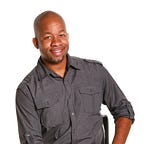How Toastmasters Messed Up My Ears
I knew I wanted to a better speaker but I didn’t know how to get any help…until, the day my wife came home and told about Toastmasters. She was working at the headquarters of an insurance company and wanted to get more comfortable with doing presentations and leading in meetings. She was feeling like whenever she presented, people gave her a quizzical look as if to show they really didn’t understand her. So, she knew she needed to do something to change that look. She found Toastmasters and mentioned her decision to join when she came home.
Toastmasters? I had no idea what this was.
Are those people who train to give toasts at weddings?
Sort of…she replied.
She went on to explain what it was and how the meetings worked. It sounded interesting but I was a teacher at the time. I was comfortable in front of my students so I didn’t know how it would help.
Then I entered the training industry and got to do some keynotes and workshops with grown-ups. I was going to need some help if I was going to keep the interest of grown-up for a 1 hour speech or a full day workshop. I decided I would attend a few meetings at a local club. I found the club and went to a few meetings but never joined.
I didn’t join until 2014 when quite a few people began to ask, “Why aren’t you speaking?”
I wanted to speak but the truth was I didn’t think I had enough to say. I was an introvert in extrovert’s clothing. I didn’t know what I could find to speak about multiple times and actually have people listen. But, I decided it was worth finding out.
I went to a meeting and was immediately reminded about one of the things Toastmasters do. They count Ahhs and Ums. These are the filler words that break up your continuity and can often create a lower perception of confidence. I volunteered to be the Ah/Um counter at one of the first meetings. I was counting Ahs, Ums, So’s, Likes and any crutch words used by the participants of the meeting. Some people filling the role are a bit relaxed about it but I was ambitious and wanted to catch everything. My ears became attuned to the filler words and I soon began hearing myself using them. When I would have conversations, it was as if there was an external critic calling to me every time I was about to use the filler word. I had to cut it out. I even began to notice the word more frequently in the speeches of people who were professionals and spoke for a living. I remember sitting to listen to a presidential speech and would up counting the ahhs used by the President.
I was addicted to Ahh/Umm counting. Well, not addicted exactly. But, I did notice them a lot more than I had in the past. I determined to cut them out from my speech, not just on stage but also in my personal conversation. The first step was simply becoming aware of them. Check. The second step was figuring out a technique. Check. Simply slow down a bit when I am talking. This had the effect of not only making me seem more polished but more thoughtful when I spoke. I learned to accept pauses as useful mechanisms for connection.
Public speaking is a huge fear for most people. But, being intentional in your personal conversation can also have a great impact. Whether you recognize it or not, stumbling and using filler words as you speak does subtly convey unsureness and hesitation. Working at this simple hiccup in your speech will increase the perception of confidence.
Now, when I say work at it, I don’t mean you should beat yourself up over the odd ‘um’ or two. I’m referring to the repeated words which indicate your level of confidence or comfort with your message. Mike Erard writes a book called Um: Slips, Stumbles & Verbal Errors & What They Mean. In it he shares how an audience might perceive some verbal fillers and how they might be beneficial.
Another writer, Selena Rezvani, shares some simple tips for working on filler words. Among them, “Chunk your information.”
Share your ideas in chunks, then pause, breathe and continue to speak. It’s ok. Your pause may seem long to you but for your listener, it’s fine.
Using these techniques will you a clearer understanding of how you can more clearly and confidently convey your ideas.
Or, you can simply go to Toastmasters and let them “mess up” your ears too!
This is Day 37 of my 12 Week Writing Journey. Here is a related post:
This article also appears on Huffington Post.
If you enjoyed this article, hang out with me to get more over at robertkennedy3.com. Sign up here to hang out.
